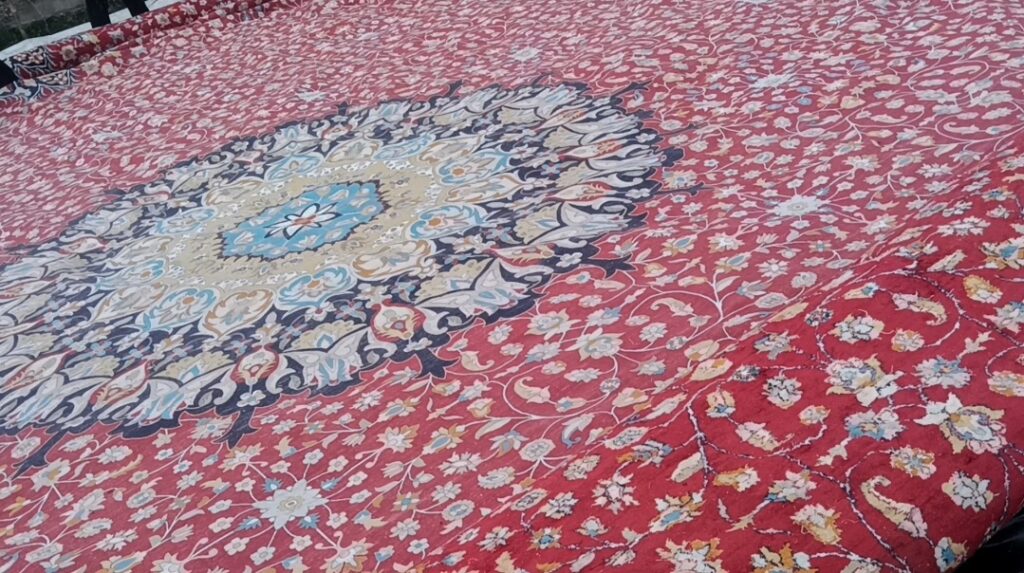Kashmiri carpets have a long history around the world and have been a part of various cultures.
This handmade category of carpets is one of the most reputable in the carpet industry. Kashmiri Carpets are known for their great finesse of artwork, distinctive designs, and superior quality and have an essence of their own, with designs that incorporate storytelling from the carpet weavers involved in their creation.
In the latest development, Kashmir has made the world’s biggest ever handmade carpet, measuring 72 feet by 40 feet (2880 sq. feet).
rinagar-based carpet exporter Fayaz Ahmad Shah, who holds this contract from a foreign country, said that it took us around 8 long years to complete this order.
He said, “In 2015, we received this order to make the biggest carpet ever. However, it took us a full year to thoroughly think about it. Finally, after a year, we started working on it. But suddenly, due to the abrogation of Article 370 and then the COVID pandemic, we faced a plethora of challenges that we had already encountered during the first year of thinking about the overall design of this carpet and the required manpower.”
He said, “Making such a big carpet was indeed a challenge. However, by the grace of Almighty and the efforts and hard work of our team, we finally succeeded after completing 8 and a half years.”
He revealed that a total of 25 laborers were working on the project, and for the past two months, they worked around the clock.
Fayaz stated, “After completing this biggest carpet, we will hand it over to our Indian agent. As for its final destination, we do not deal further.”
He mentioned, “This is Asia’s biggest carpet that we have made. Our whole family has been affiliated with the carpet business for decades. It is our heritage business, and we also deal with shawls.”
Fayaz highlighted that the carpet was knitted under the master supervision of two veterans brothers of the craft, Habibullah and Abdul Gaffar Shiekh. These individuals ensured that the carpet was completed despite the odds.
Fayaz, appealed to the government to support this industry, as it has played a vital role in providing employment opportunities for thousands of youths, especially in far-flung areas.
Habibullah Shiekh, who, along with his brother Abdul Gaffar Shiekh, supervised around 25 laborers at Wail Kralpora in north Kashmir’s Tangmarg stated in a conversation with Kashmir Despatch that in 2015, a Srinagar-based exporter approached them based on their family’s 45 years of affiliation with the carpet business.
Habibullah explained, “After detailed discussions on this project, it took almost a year to begin. After starting, we put 25 laborers to work, and after a significant delay, we have finally completed it. It is ready now.”
He also mentioned that they are working on another big project, which will take around two years to complete.
Mohammad Akbar Dar, a worker from Mohanpora who was part of completing this biggest carpet, told Kashmir Despatch that this was a foreign order, and through a Srinagar-based dealer, they got the opportunity to work on it.
He said, “We worked hard for the past eight years to create this record. However, we only receive normal wages on a daily basis. We keep this tradition alive just to have some work for our survival. It’s very hard to survive on this small amount in the era of technology.”
Dar added that the government has never supported or helped them to boost this art form, but they continue to fight to preserve this traditional art. However, the number of people working on it is decreasing.
He appealed for the government to come up with schemes to boost this poor section of laborers.
Another worker, Wali Mohammad, stated, “No doubt, we made this biggest carpet, but the question remains the same: we laborers are still laborers.”
He emphasized the need for focusing on them and acknowledging their skillfulness despite working with meager wages. He said, “It’s all our hard work, our blood, and soul, which the government should recognize and support.”
Despite the challenges, they feel proud to be part of this record-breaking carpet and hope that it will change their future. They expressed hope that the government, especially Prime Minister Narendra Modi and Lieutenant Governor Manoj Sinha, will take special measures to support this industry.

